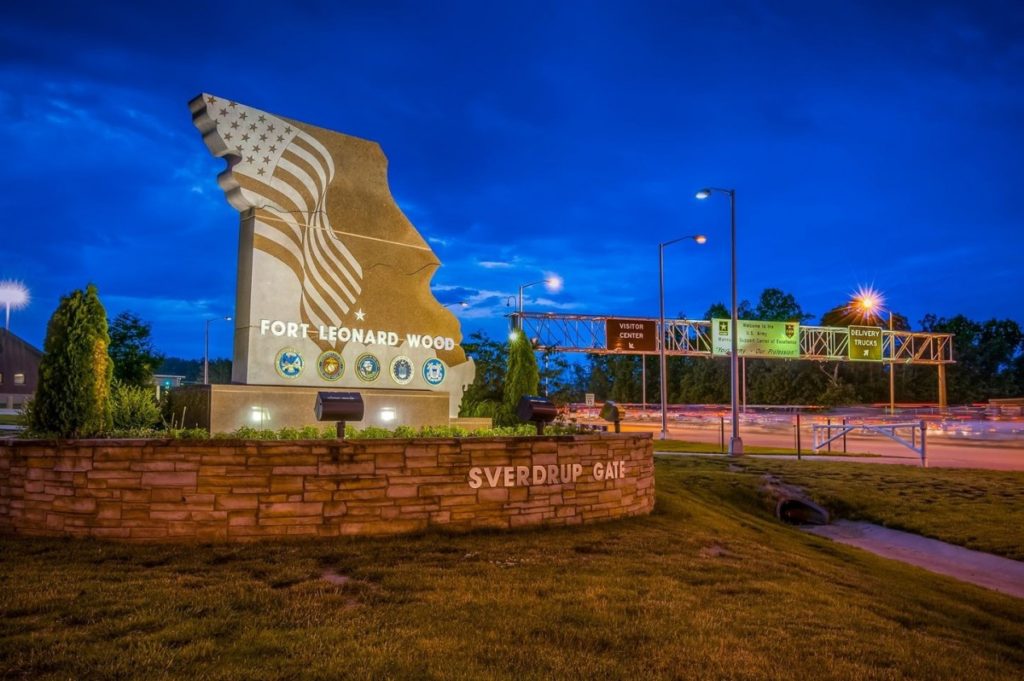Sam Campbell
FORT LEONARD WOOD, Mo. (Nov. 6, 2019) – Seven teams of ROTC cadets from 3rd Brigade, U.S. Army Cadet Command, competed at Fort Leonard Wood in a physically and mentally rigorous, three-day competition designed to test the future officers’ aptitude for combat operations — the Blackhawk Ranger Challenge.
From Nov. 1 to 3, cadets battled to achieve the best rating in 14 tasks, including: M4 rifle and M9 pistol marksmanship, weapon disassembly, hand grenade assault tactics, combat swimming, functional fitness, casualty care, rope bridge crossing, call-for-fire operations, day and night land navigation and two obstacle courses.
Between events, and with 35-pound rucksacks in tow, cadets were timed on their march from task to task.
The winning nine-cadet team from Saint John’s University, Minnesota, and the second-place team from Marquette University, Wisconsin, will go on to represent the brigade in April at the Sandhurst Military Skills Competition — a highly-prestigious, and internationally-attended course at West Point, New York.
Col. Jesse Phillips, 3rd Brigade commander, said cadets began preparing for the Blackhawk Ranger Challenge a year in advance.
Maj. Eric Wahner, Missouri State University ROTC advisor, supervised cadets’ M4 marksmanship at Range 3. He said they go “way above and beyond the norm” in preparation.
“I watch the amount of effort they put into it,” Wahner said. “They’re working out two hours every morning, doing some pretty heavy, intensive training just for this event.”
Merely competing in events like the Blackhawk challenge and the Sandhurst competition will build their potential as future lieutenants, Phillips said.
“The opportunity for these cadets to get a chance to compete and train is going to make them a better leader down the road, and any way we can try to facilitate that and try to make them better leaders is better for our Army,” he said. “There are a lot of bright people out there — (the cadets) are going to be great leaders.”
Wahner said among those who compete in the ranger challenges, he has noticed a marked improvement in future training events, such as advanced camp — a month-long ROTC training event, which is designed to test cadets’ ability to lead at the squad and platoon levels, and is required to commission as an officer.
“All the (cadets) I know who have gone through ranger challenges in the last couple years,” he said, “they’re flying through the Basic Officer Course, and they’re fast-tracking. It’s getting them set up for success.”
Phillips commended the 3rd Brigade’s partnership with Fort Leonard Wood.
“It truly is a partnership of how we help each other in creating those future leaders of the Army,” he said. “Just the support we get at Fort Leonard Wood epitomizes that.”




-30-
About Fort Leonard Wood
Fort Leonard Wood is a thriving and prosperous installation that has evolved from a small basic training post more than 75 years ago to a premier Army Center of Excellence that trains more than 80,000 military and civilians each year.
Fort Leonard Wood is home to the U.S Army Maneuver Support Center of Excellence and three U.S. Army schools: the U.S. Army Engineer School; U.S. Army Chemical, Biological, Radiological and Nuclear School; and the U.S. Army Military Police School. In addition to training engineer, CBRN and military police specialties for the Army, Fort Leonard Wood also provides gender-integrated in-processing and Basic Combat Training for new Soldiers.
Fort Leonard Wood also hosts and trains with the largest Marine Corps Detachment and Air Force Squadron on any Army installation as well as a large Navy construction detachment.
More information about Fort Leonard Wood is at: https://home.army.mil/wood/index.php/about/mission


